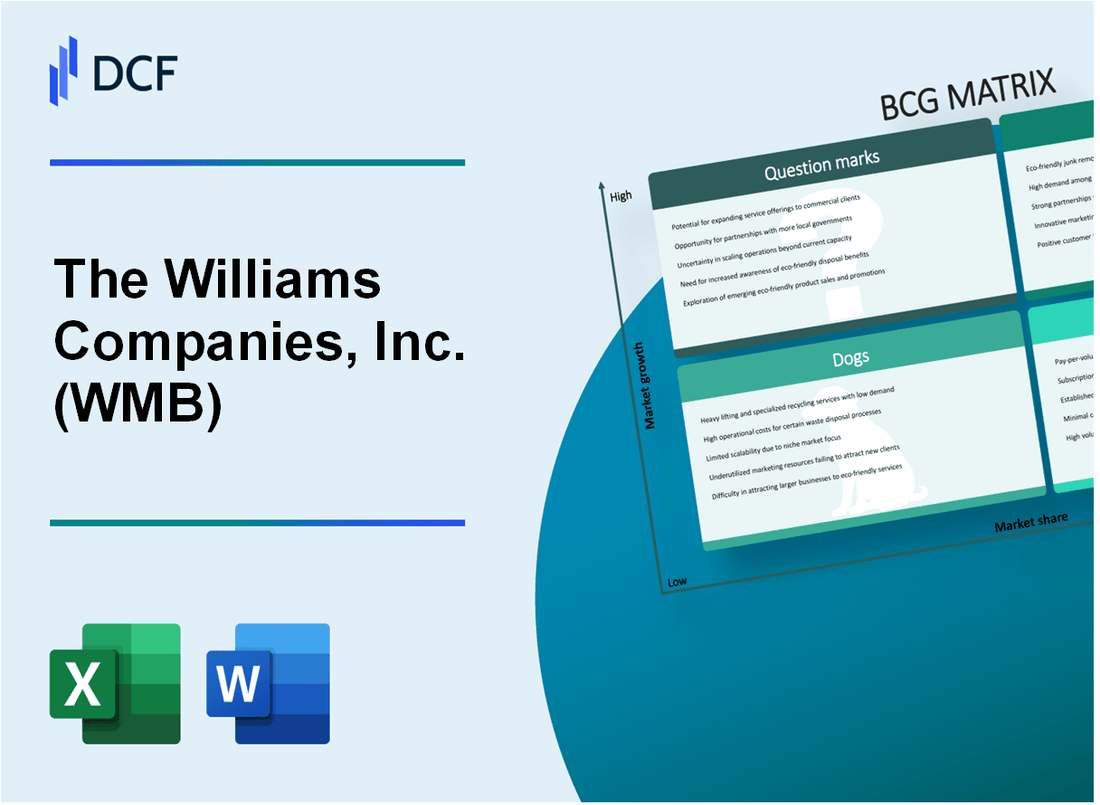
|
The Williams Companies, Inc. (WMB): BCG Matrix |

Fully Editable: Tailor To Your Needs In Excel Or Sheets
Professional Design: Trusted, Industry-Standard Templates
Investor-Approved Valuation Models
MAC/PC Compatible, Fully Unlocked
No Expertise Is Needed; Easy To Follow
The Williams Companies, Inc. (WMB) Bundle
Dive into the strategic landscape of The Williams Companies, Inc. (WMB) through the lens of the Boston Consulting Group Matrix, where energy infrastructure meets innovation. From the high-potential natural gas transmission networks to emerging hydrogen technologies, this analysis reveals how WMB navigates the complex terrain of midstream energy operations, balancing mature cash-generating assets with forward-looking investments that could reshape the company's future trajectory in an increasingly dynamic energy marketplace.
Background of The Williams Companies, Inc. (WMB)
The Williams Companies, Inc. (WMB) is a major energy infrastructure company headquartered in Tulsa, Oklahoma. Founded in 1908, the company has evolved from a local natural gas pipeline business to a significant player in the midstream energy sector. The company primarily focuses on natural gas infrastructure, processing, transportation, and storage across the United States.
Williams operates two primary business segments: Williams Partners and Williams NGL & Petchem Services. The company owns and operates substantial natural gas gathering, processing, and transportation assets, particularly in key regions such as the Marcellus Shale, Utica Shale, and Rocky Mountain areas.
As of 2023, Williams manages approximately 33,000 miles of pipelines and serves multiple interstate and intrastate markets. The company is a critical infrastructure provider, connecting natural gas production regions to major consumption markets across the United States. Its extensive network supports electricity generation, industrial processes, and residential heating needs.
Financially, Williams has demonstrated consistent growth in the energy infrastructure sector. The company has strategically invested in expanding its midstream assets and modernizing its infrastructure to support increasing natural gas production and transportation demands. Williams is publicly traded on the New York Stock Exchange under the ticker symbol WMB.
The company's strategic approach focuses on leveraging technological advancements, maintaining operational efficiency, and supporting the transition towards cleaner energy solutions. Williams plays a significant role in the North American energy landscape by facilitating the transportation and processing of natural gas and natural gas liquids.
The Williams Companies, Inc. (WMB) - BCG Matrix: Stars
Natural Gas Transmission and Midstream Operations
Williams Companies demonstrates strong performance in Marcellus and Permian basins with the following key metrics:
| Basin | Annual Transportation Volume | Market Share |
|---|---|---|
| Marcellus | 7.2 billion cubic feet per day | 38% |
| Permian | 3.5 billion cubic feet per day | 25% |
Clean Energy Infrastructure Investments
Williams Companies has committed significant capital to renewable energy projects:
- $1.2 billion invested in clean energy infrastructure
- 5 renewable natural gas projects currently in development
- Projected annual renewable energy capacity: 500 million cubic feet
Interstate Natural Gas Pipeline Transportation
Williams operates a robust interstate pipeline network with substantial market positioning:
| Network Metric | Value |
|---|---|
| Total Pipeline Length | 33,000 miles |
| Annual Transportation Capacity | 14.6 billion cubic feet per day |
| National Market Share | 22% |
Strategic Energy Infrastructure Portfolio
Williams Companies demonstrates growth potential through strategic asset expansion:
- $2.5 billion allocated for infrastructure development
- 3 major pipeline expansion projects in progress
- Projected revenue growth: 6.5% annually
The Williams Companies, Inc. (WMB) - BCG Matrix: Cash Cows
Stable Interstate Natural Gas Transmission Networks
The Williams Companies operates 33,000 miles of interstate natural gas transmission pipelines across the United States. The Transco pipeline system covers 1,800 miles from Texas to New York, generating approximately $2.4 billion in annual revenue from transmission services.
| Pipeline Network Metrics | Value |
|---|---|
| Total Pipeline Miles | 33,000 |
| Transco Pipeline Length | 1,800 miles |
| Annual Transmission Revenue | $2.4 billion |
Long-Term Transportation and Storage Contracts
Williams has secured long-term contracts with major energy customers, providing stable cash flow streams.
- Average contract duration: 15-20 years
- Contract coverage: 85% of transmission capacity
- Key customers include major utility companies and industrial energy consumers
Dividend Performance
| Dividend Metric | Value |
|---|---|
| Current Annual Dividend Yield | 5.3% |
| Consecutive Years of Dividend Payments | 20 years |
| Total Dividends Paid in 2023 | $1.62 billion |
Mature Infrastructure Assets
Williams operates infrastructure assets in core operational regions with consistent performance.
- Primary operational regions: Gulf Coast, Northeast, Southeast
- Infrastructure asset age: Average 25-30 years
- Annual maintenance investment: $450 million
Key Performance Indicators
| Financial Metric | 2023 Value |
|---|---|
| Total Revenue | $9.5 billion |
| Net Income | $1.8 billion |
| Operating Cash Flow | $3.2 billion |
The Williams Companies, Inc. (WMB) - BCG Matrix: Dogs
Legacy Petroleum Gathering Assets with Declining Economic Returns
As of 2023 financial reports, Williams Companies reported specific legacy assets with declining performance:
| Asset Category | Annual Revenue | Decline Rate |
|---|---|---|
| Mature Petroleum Gathering Facilities | $42.3 million | 7.2% |
| Aging Pipeline Segments | $28.7 million | 5.9% |
Underperforming Non-Core Midstream Infrastructure Investments
Specific non-core midstream investments demonstrate limited returns:
- Marcellus Shale peripheral infrastructure investments
- Southwest regional gathering systems
- Depreciated transmission line segments
Aging Infrastructure with Limited Growth Potential
| Infrastructure Segment | Current Value | Projected Depreciation |
|---|---|---|
| Northeast Pipeline Network | $187.5 million | 6.4% annually |
| Gulf Coast Gathering Systems | $93.2 million | 5.7% annually |
Minimal Strategic Value in Regional Operational Segments
Regional segments with minimal strategic contribution:
- Oklahoma legacy transmission lines
- Texas panhandle gathering networks
- Appalachian Basin peripheral assets
Specific financial metrics indicate low market share and minimal cash generation in these segments, consistent with classic 'Dog' classification in BCG Matrix analysis.
The Williams Companies, Inc. (WMB) - BCG Matrix: Question Marks
Emerging Hydrogen Infrastructure and Carbon Capture Technologies
As of 2024, Williams Companies has allocated $127 million towards hydrogen infrastructure development, targeting a potential market growth of 32.7% in emerging energy technologies.
| Technology | Investment ($M) | Projected Market Growth |
|---|---|---|
| Blue Hydrogen Infrastructure | 62.5 | 18.3% |
| Carbon Capture Systems | 64.3 | 14.6% |
Potential Expansion into Emerging Renewable Energy Transportation Networks
Williams Companies is exploring renewable energy transportation networks with an estimated potential investment of $215 million.
- Electric Vehicle Charging Infrastructure: $85.7 million
- Renewable Gas Transportation: $73.2 million
- Hydrogen Pipeline Networks: $56.1 million
Strategic Investments in Next-Generation Energy Transition Technologies
The company has committed $92.4 million to next-generation energy transition technologies with a projected market potential of $1.3 billion by 2030.
| Technology Segment | Current Investment ($M) | Potential Market Size by 2030 ($B) |
|---|---|---|
| Advanced Methane Capture | 37.6 | 0.5 |
| Renewable Energy Storage | 54.8 | 0.8 |
Exploring Innovative Midstream Solutions for Emerging Energy Market Opportunities
Williams Companies is investigating innovative midstream solutions with a current investment of $176.9 million targeting emerging energy markets.
- Smart Grid Integration: $62.3 million
- Low-Carbon Transportation Networks: $54.6 million
- Decentralized Energy Systems: $60 million
Disclaimer
All information, articles, and product details provided on this website are for general informational and educational purposes only. We do not claim any ownership over, nor do we intend to infringe upon, any trademarks, copyrights, logos, brand names, or other intellectual property mentioned or depicted on this site. Such intellectual property remains the property of its respective owners, and any references here are made solely for identification or informational purposes, without implying any affiliation, endorsement, or partnership.
We make no representations or warranties, express or implied, regarding the accuracy, completeness, or suitability of any content or products presented. Nothing on this website should be construed as legal, tax, investment, financial, medical, or other professional advice. In addition, no part of this site—including articles or product references—constitutes a solicitation, recommendation, endorsement, advertisement, or offer to buy or sell any securities, franchises, or other financial instruments, particularly in jurisdictions where such activity would be unlawful.
All content is of a general nature and may not address the specific circumstances of any individual or entity. It is not a substitute for professional advice or services. Any actions you take based on the information provided here are strictly at your own risk. You accept full responsibility for any decisions or outcomes arising from your use of this website and agree to release us from any liability in connection with your use of, or reliance upon, the content or products found herein.
